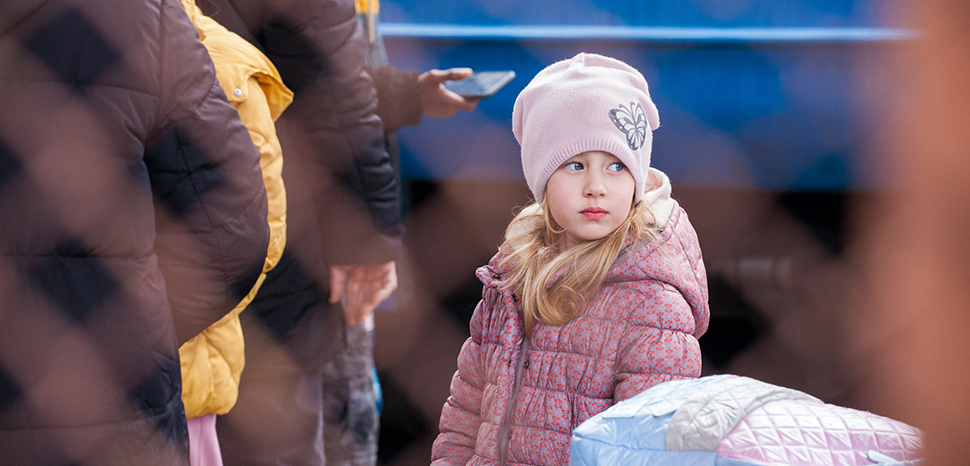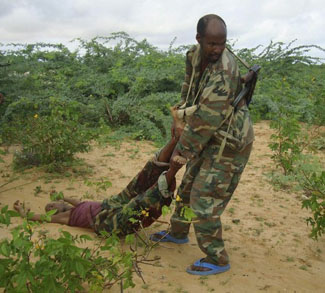Genocide; it’s a word that gets thrown around a lot these days. It’s an all-encompassing accusation, and leaves no room for discussion, negotiation, or debate. Its employment signals the end of civil discourse, and insists upon the acceleration of verbal hostilities. And why wouldn’t it? The word alone summons appalling imagery from the most tragic moments in our history. Through the years however, it’s true definition and effect have been warped through its constant politicization. What is occurring in Russian-occupied Ukraine subverts both our common understanding of what genocide means, and what it can look like in practice. There may not be extermination camps in Mariupol or killing fields outside of Kharkiv, but what Russia is attempting to accomplish through its occupation is nothing short of cultural and political genocide.
Back in March, as millions of people from around the world obsessed over hourly updates from the unfolding crisis in Ukraine, Moscow was already undertaking an intensive, albeit far less entertaining, effort at subduing their Slavic neighbors. Although it would not be public knowledge for another few months, the military was already kidnapping and deporting Ukrainian civilians back to Russia. While it may seem odd to us, it’s a surprisingly common tactic that Russia has used before. Perhaps the most infamous example of its usage would be the 1944 deportation of half a million Chechens to Central Asia, after Soviet leader Joseph Stalin accused the group of conspiring with Nazi Germany. While curious to us, the Ukrainians who have experienced this horrific abduction have a far darker view on the subject.
On March 18, Volodymyr Khropun was driving a school bus filled with injured civilians through hostile territory in an attempt to reach safety when his vehicle was stopped by Russian troops. Promptly detained, Khropun was dragged to the basement of a nearby townhouse where he, along with 40 others, were subjected to torture.
“We were beaten with rifles, punched, and kicked. They blindfolded me and tied my hands with duct tape. They used Tasers and kept asking for information about the military,” Volodymyr told the BBC. After a week, the Red Cross volunteer was forcibly deported to Russia, only escaping becoming a permanent resident thanks to a prisoner swap in Crimea. “We tried to support each other. Some days we couldn’t believe this was all happening. It felt like we had been transported to the 16th Century from the 21st Century,” he continued. It may be tempting to dismiss Mr. Khropun’s experience as particularly unique or novel, but since his seizure, a much clearer picture of the situation has become apparent.
On July 14, US Secretary of State Anthony Blinken accused Russia of forcibly extracting over 1 million civilians from occupied Ukraine. “The unlawful transfer and deportation of protected persons is a grave breach of the Fourth Geneva Convention on the protection of civilians and is a war crime,” Blinken told reporters during his press conference. Shockingly, U.S. intelligence showed that Russian officials were even kidnapping Ukrainian children and subsequently putting them up for adoption back in Russia. In all, an estimated 260,000 Ukrainian minors have gone missing since the invasion.
Since the beginning of hostilities, Russia has made it clear that it does not consider the conflict to be of a traditional nature in terms of sovereignty. As with their 2014 seizure of Crimea, Moscow recognizes the ongoing struggle as an effort to reabsorb Ukraine back into the Russian fold. The consolidated opinion among Russian leaders is that Ukraine is not being invaded, but restored back into its ancestral home. “The Ukraine that you and I had known, within the borders that used to be, no longer exists, and will never exist again,” Kremlin spokeswoman Maria Zakharova told reporters on June 17. Despite all evidence to the contrary, Russia has continued to maintain that the mass-exodus of Ukrainian civilians is for safety purposes.
There is finally one more detail worth noting; fundamentally, Russia is dying. It’s been well-established that Russia has suffered from a severe brain-drain in recent decades, but what is perhaps less obvious is that the nation’s population is declining at an alarming rate. Since the 1990s, Russia’s population has decreased by two million people, all while alcohol consumption, crime, and poverty rates have continued to skyrocket.
Since coming to power in 2000, President Vladimir Putin has been very vocal about his commitment to stemming the decline. The government has feverishly provided financial assistance and monetary enticements to Russian women willing to have babies. “Putin is obsessed with this demographic issue,” demographer Laurent Chalard told France 24 News “In his mind, the power of a country is linked to the size of its population. The larger the population, the more powerful the state.”
Whether it be for perceived historical justice or very real demographic concerns, Russia has concluded that in order to fully assimilate occupied Ukraine, it must first annihilate it culturally and politically. Ukraine, as a national identity distinct from Russia, cannot co-exist in the retro-czarist fantasy that Putin is pursuing. Instituting a national policy of mass-migration from their communities to foreign lands reflects his profound delusional obsession with resurrecting the Russian Empire. What is being done is not the extermination of a people, but of a people’s identity
It’s been nearly five months since Moscow launched its full-scale offensive against Ukraine, marking the inauguration of the first true European land conflict since the end of the Cold War.
In the decades that preceded this historic event, analysts and politicians alike bemoaned the
consequences of such a possible conflict, conjuring images on day-time television of the nuclear apocalypse that was barely avoided in the 1960s. But so far, the anatomy of the contest has proven to be entirely traditional. Moscow so far has utilized the conventional 20th century tools of conquest: aerial bombardment, naval blockades, and land-based assaults. While surely this reluctance to enhance the severity of these accepted methods of warfare is a relief, it has downgraded the sense of urgency in the West, and blinded too many people to what is perhaps the true motivation of the Russian attack. Because while the international community loiters, Russian-occupied Ukraine is experiencing nothing less than an exhaustive attempt at political and cultural genocide.
The views expressed in this article belong to the authors alone and do not necessarily reflect those of Geopoliticalmonitor.com
*This article was originally published on July 19, 2022.




